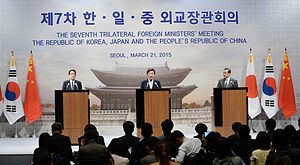China, Japan, and South Korea held their highest-level trilateral meeting in almost three years on Saturday. Chinese Foreign Minister Wang Yi, Japanese Foreign Minister Fumio Kishida, and South Korean Foreign Minister Yun Byung-se met in Seoul on March 21 for the first trilateral foreign ministers’ meeting since April 2012.
In a joint press release issued after the meeting, Wang, Kishida, and Yun affirmed their countries’ commitment to trilateral cooperation. “[T]he deepening of trilateral cooperation… contributes to each bilateral relations and to the peace, stability and prosperity of the Northeast Asian region,” the statement said. Accordingly, China, Japan, and South Korea agreed to resume a number of trilateral dialogues, including talks on counter-terrorism, cyber policy, air pollution, and people-to-people exchanges. The statement also emphasized that China-Japan-South Korea cooperation on a number of anodyne issues (such as disaster management, cultural exchanges, public health, and investment) had continued despite the tensions of the past three years.
In addition to trilateral issues, the ministers discussed a number of regional and international hot spots, from North Korea’s nuclear program to issues in the Middle East and Ukraine.
However, while the bulk of the official joint press release dealt with the future, historical issues remained a major undercurrent at the talks. Prior to the meeting, Chinese Foreign Ministry spokesperson Hong Lei said, “The history issue must not be shelved during the foreign ministers’ meeting… China hopes that the three foreign ministers can seize this opportunity to candidly exchange views on the history issue.”
Sure enough, Wang Yi stressed the history issue, particularly in his bilateral meeting with Kishida. Wang said the 70th anniversary of the end of World War II was putting historical issues in the spotlight. “I hope Japan could grasp the opportunity and face up to the history in order to unload the historical burden and advance toward the future with its neighbors,” Wang said. According to Japan’s Asahi Shimbun, Wang said the “most important outcome” of the trilateral meeting was having a reference to “facing history squarely” included in the joint press release.
Wang also brought historical issues into his bilateral meeting with Yun Byung-se, inviting South Korean President Park Geun-hye to attend China’s commemoration of the end of the war. Russian President Vladimir Putin is also expected to attend.
History was also under discussion in bilateral talks between Yun and Kishida. The two sides promised to “encourage progress in the ongoing bilateral consultations to resolve the issue of sexual slavery victims drafted by Japan’s Imperial Army during World War II,” according to South Korea’s Ministry of Foreign Affairs. The issue of “comfort women” has become a major sticking point in Japan-South Korea relations, much to the United States’ dismay.
The joint statement also said that all sides would “continue their efforts to hold the Trilateral Summit at the earliest convenient time for the three countries.” A leaders’ summit, bringing together Chinese Premier Li Keqiang (Wen Jiabao, Li’s predecessor, was China’s representative at past summits), South Korean President Park Geun-hye, and Japanese Prime Minister Shinzo Abe, would be the ‘holy grail’ of trilateral cooperation.
In Friday’s press conference, however, Chinese Foreign Ministry spokesman Hong Lei stressed that the “proper political atmosphere is required for a leaders’ meeting to happen.” Asahi Shimbun reports that China is more reluctant than either Japan or South Korea to allow a trilateral leaders’ summit. Previously, media reports suggested that before committing to a summit, China would want to wait and see how Japanese Prime Minister Shinzo Abe addresses historical issues in his speech on the 70th anniversary of the end of World War II.
































